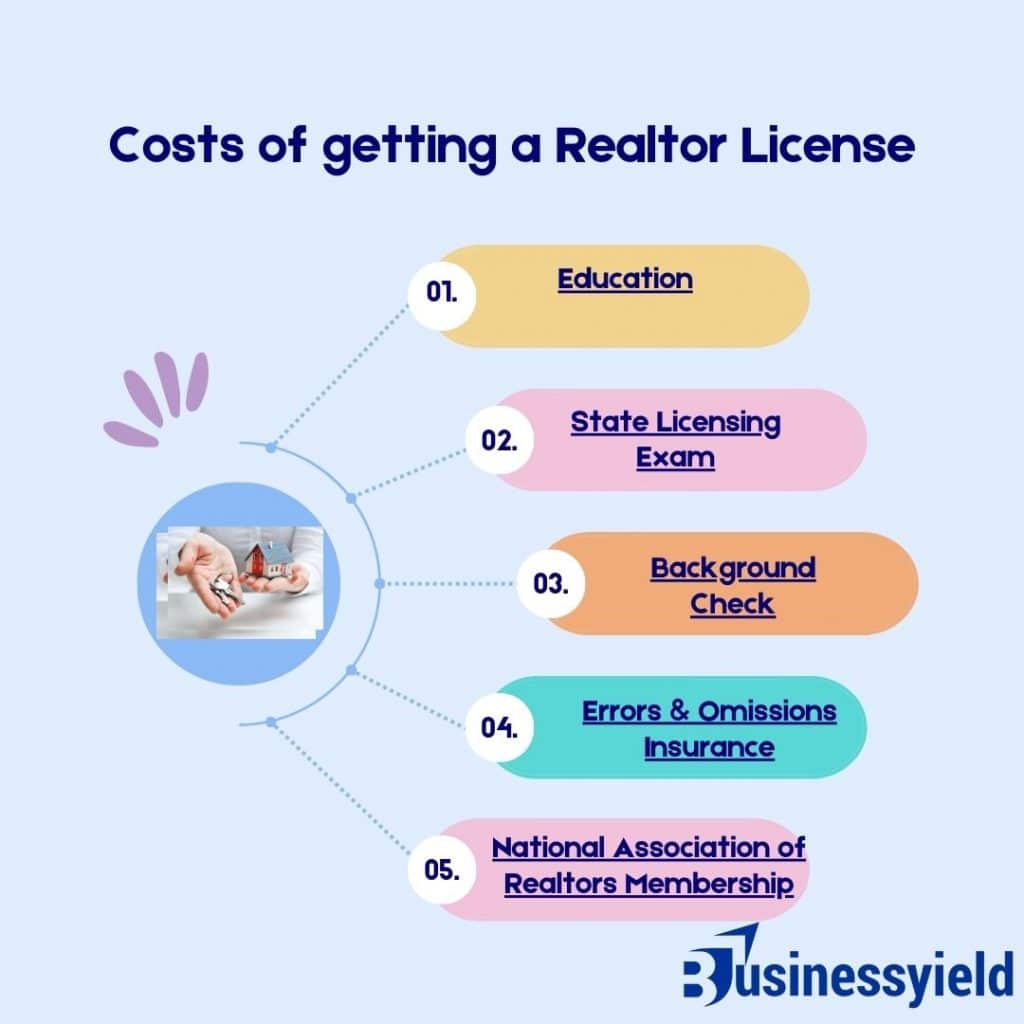I know that getting a realtor license can help to upgrade your career as a real estate agent. It also increases your chances by giving you access to valuable tools, networks, and information that many do not have access to in the industry.
Getting a real estate license is one of the most valuable assets to a realtor, but note that its benefits come with a price. Therefore, this article answers how much it costs to get a Realtor License.
Key Points
- A realtor is a real estate professional and a National Association of Realtors (NAR) member.
- The cost of a realtor license depends on the state.
- You can get your realtor license in less than six months.
- The period of time required to get your realtor license depends on your location and your dedication to the process.
- You may not requite a degree to become a realtor in certain states in the USA.
Costs of getting a Realtor License

There are some costs that are tied to getting a realtor license. This is because to obtain a realtor license, you need to enroll in courses, apply for tests, and engage in marketing responsibilities. Each of these requires a certain amount of financial investment. Read through to find out the associated costs of getting a realtor license:
#1. Education
Average Costs: $200 to $1,000
Each state has its own educational requirements for those looking to get a real estate license. People who want to take the state exam should have completed a predetermined amount of studying. However, the number of “credit hours” ranges from 63 hours in Florida to 180 hours in Texas.
Note that the cost of educational requirements depends on the number of hours required by the state. However, with as little as $200, you can get an education.
#2. State Licensing Exam
Average Costs: $85 to $200 per test
To the best of my knowledge, none of the educational courses designed to get you ready for the state licensure exam include the actual test fee. Therefore, while budgeting, the exam needs to be considered a separate expense for anyone trying to determine the true cost of becoming a registered real estate agent.
An examination for a state license often costs between $85 and $200. Nonetheless, this is not a one-time expense. Those who succeed on their first attempt are free to proceed to the next phase, at their own expense. As a result, individuals who fail the exam on their first attempt can retake it for a fee. This is why you need to take your education seriously. Not only will it lay the groundwork for your entire future profession, but it will also save you from having to retake the state license exam.
#3. Background Check
Average Costs: $50 to $100
Note that anyone who wants to become a licensed real estate agent must pass an FBI background check, and it’s not free.
Your Social Security number and fingerprints must be given to the appropriate authorities. Therefore, the processing fees attached to each check are what you have to pay. Thankfully, background checks don’t cost a lot—they should only cost you $50 to $100.
#4. Errors & Omissions Insurance
Average Costs: $350 to $400/year
Errors and omissions insurance is a kind of professional liability insurance that defends businesses, their employees, and individual policyholders against client allegations of carelessness or subpar performance. In most cases, errors and omissions insurance pays for settlements up to the agreed-upon maximum as well as court expenses.
It seems reasonable that every licensed realtor should carry errors and omissions insurance because, in the housing market, even seemingly insignificant transactions carry big consequences. The annual cost should be around $400. If not, the moment your mistakes and omissions insurance policy expires, your license will be automatically suspended.
#5. National Association of Realtors Membership
Costs: sign-up fee plus $150/year
By joining the National Association of Realtors, you gain access to a wealth of resources, including the multiple listing service.
The official website of the National Association of Realtors states that the dues for 2021 and 2022 are $150 per member. All current REALTOR® and REALTOR® Associate members get a bill for this amount through their principal local organization, and it is due and payable to NAR by January 1.
Additionally, you pay the under-$100 cost for ethics class and the sign-up fee for the real estate market. As there is always something new to learn in this ever-changing industry, many find the cost of a real estate license and continuing education to be well worth the investment.
How to Be a Realtor Checklist
How Much Is A Realtor License In Each State?
The following list of average realtor license fees could change at any time. The average cost of the licensing fee required for pre-license coursework, and the total for each state are listed below:
Alabama
License Fee: $220
Pre-License Education: $300-$400
Total: $600
Alaska
License Fee: $355
Pre-License Education: $375
Total: $730
Arizona
License Fee: $300
Pre-License Education: $400
Total: $700
Arkansas
License Fee: $197
Pre-License Education: $400
Total: $597
California
License Fee: $400
Pre-License Education: $400
Total: $800
Colorado
License Fee: $615
Pre-License Education: $500
Total: $1,115
Connecticut
License Fee: $305
Pre-License Education: $450
Total: $755
Delaware
License Fee: $89
Pre-License Education: $600
Total: $689
Florida
License Fee: $150
Pre-License Education: $200
Total: $350
Georgia
License Fee: $170-$340
Pre-License Education: $350
Total: $540-$690
Hawaii
License Fee: $85
Pre-License Education: $650
Total: $739
Idaho
License Fee: $160
Pre-License Education: $600
Total: $760
Illinois
License Fee: $125
Pre-License Education: $450
Total: $575
Indiana
License Fee: $121
Pre-License Education: $550
Total: $671
Iowa
License Fee: $125
Pre-License Education: $425
Total: $575
Kansas
License Fee: $75
Pre-License Education: $225
Total: $400
Kentucky
License Fee: $192
Pre-License Education: $400
Total: $592
Louisiana
License Fee: $120
Pre-License Education: $350
Total: $470
Maine
License Fee: $121
Pre-License Education: $450
Total: $571
Maryland
License Fee: $110
Pre-License Education: $300
Total: $410
Massachusetts
License Fee: $103
Pre-License Education: $350
Total: $453
Michigan
License Fee: $88
Pre-License Education: $250
Total: $338
Minnesota
License Fee: $175
Pre-License Education: $600
Total: $775
Mississippi
License Fee: $135
Pre-License Education: $250
Total: $385
Missouri
License Fee: $201.05
Pre-License Education: $400
Total: $601.05
Montana
License Fee: $135
Pre-License Education: $400
Total: $535
Nebraska
License Fee: $285
Pre-License Education: $400
Total: $685
Nevada
License Fee: $245
Pre-License Education: $250
Total: $495
New Hampshire
License Fee: $225
Pre-License Education: $360
Total: $585
New Jersey
License Fee: $160
Pre-License Education: $360
Total: $520
New Mexico
License Fee: $240
Pre-License Education: $700
Total: $940
New York
License Fee: $70
Pre-License Education: $350
Total: $420
North Carolina
License Fee: $96
Pre-License Education: $475
Total: $571
North Dakota
License Fee: $230
Pre-License Education: $450
Total: $680
Ohio
License Fee: $60
Pre-License Education: $999
Total: $1,059
Oklahoma
License Fee: $116
Pre-License Education: $425
Total: $541
Oregon
License Fee: $300
Pre-License Education: $375
Total: $675
Pennsylvania
License Fee: $107
Pre-License Education: $350
Total: $457
Rhode Island
License Fee: $100
Pre-License Education: $325
Total: $425
South Carolina
License Fee: $123
Pre-License Education: $500
Total: $623
South Dakota
License Fee: $225
Pre-License Education: $1,000
Total: $1,225
Tennessee
License Fee: $133
Pre-License Education: $500
Total: $633
Texas
License Fee: $320
Pre-License Education: $475
Total: $795
Utah
License Fee: $152
Pre-License Education: $450
Total: $602
Vermont
License Fee: $100
Pre-License Education: $300
Total: $400
Virginia
License Fee: $170
Pre-License Education: $500
Total: $670
Washington
License Fee: $146.25
Pre-License Education: $400
Total: $546.25
West Virginia
License Fee: $196
Pre-License Education: $550
Total: $746
Wisconsin
License Fee: $144
Pre-License Education: $325
Total: $469
Wyoming
License Fee: $480
Pre-License Education: $400
Total: $880
How Long Does It Take To Get Your Realtor License?
The number of hours your state requires, the duration of the application procedure, and whether you take an online course or a classroom school will all affect how long it takes you to obtain your realtor license. The length of time it takes to obtain your license if you enroll in a classroom course will vary depending on how many hours are offered each week, but it can usually be finished in six months.
Fortunately for you, you can work and study at your own pace with online real estate license courses, which can cut down on the time it takes to pass your real estate license exam.
How Important Is Getting Your Realtor License?
If you are serious about your career, obtaining your realtor license may be well worth the expense. You can make up to six figures if you stick with it, expand your network, and show dedication. There are also chances to advance your career in the future by becoming a broker or appraiser.
Your level of success in the sector will ultimately determine how valuable the licensing process is. For the foreseeable future, do you intend to work in the real estate industry? Are you sure you want to invest the time necessary to create and manage a network? Can you make a living just off of commissions? If you give these questions some thought before you begin, you might discover that the procedure is ultimately very worthwhile.
Do you need a degree to be a Realtor in Texas?
Texas does not require any kind of degree to work as a real estate sales agent, unlike certain other states. Additionally, you do not need a high school diploma or a GED.
How long does it take to be a Realtor in Texas?
Before taking the state licensure exam, students must successfully complete six 30-hour real estate courses mandated by the Texas Real Estate Commission (TREC). (A student’s total number of classroom hours will increase if they need to repeat a course.)
Is it hard to start as a realtor?
Although it’s not always simple, becoming a realtor may be a financially rewarding and enjoyable job. Getting business, marketing yourself, following leads, managing complicated paperwork, offering customer service, and a lot, lot more are all necessary for a career in real estate.
What are the pros of being a real estate agent?
There are many benefits to being a real estate agent for your personal and professional lives. It is easy for you to decide if you would find contentment in this career path if you are aware of the advantages this career offers. Here, I will give you some benefits of working as a real estate agent:
#1. It offers you a flexible schedule
You may arrange your work hours to accommodate your personal life because you are your own employer as a real estate salesperson. This implies that you don’t have set start or end times for your workdays or clock in and out.
I have friends who are real estates agents and the job gives them more time to spend with friends and family which will improve your work-life balance and job satisfaction.
#2. It gives you unlimited income potential
There is no income cap for real estate agents, unlike other professions. You can achieve greater success in your real estate agent career if you have a solid understanding of business and a great deal of dedication. Furthermore, you don’t have to work for a certain period of time in order to get a raise.
#3. Career mobility
Being a real estate agent gives you the opportunity to work for yourself. In essence, this is your chance to establish your own company and identity. With your real estate agent experience, you can also look for additional possibilities within and outside of the real estate sector. One possible job path is to become a real estate investor, home appraiser, property manager, leasing consultant, office manager, sales associate, or customer service representative.
What are the cons of being a real estate agent?
Although there are many benefits to becoming a real estate agent, it’s crucial to consider the drawbacks as well in order to make an informed choice. Think about the following drawbacks of working as a real estate agent:
#1. You spend long hours working:
Real estate brokers may work longer hours than the 40-hour workweek that many other jobs require. Instead of following a rigid timetable, they frequently accommodate the schedules of their clients. When their clients and potential buyers are most likely unemployed, they might hold open houses or showings. This could entail working on the weekends or in the evenings of workdays. Even though you might have some free time on a weekday morning or afternoon, you might miss out on weekend time spent with loved ones.
#2. It has slow periods
Your income as a real estate agent is determined on the transactions you complete. Slower months can have a detrimental impact on your income if you don’t have a fixed salary from your job. You will not get paid if you are not selling real estate. Thus, having limitless earning potential is great, but it can be difficult if you don’t have a certain amount of money saved up for bad times.
#3. It can be stressful
Even if you get to witness the thrill of helping your clients move into a new house or property, the procedure is frequently stressful. Your clients frequently experience conflict and may make important financial decisions. As rewarding as it is to assist clients, there are difficult times in this line of work. Gaining real estate expertise and soft skills like empathy and communication will enable you to relate to and assist your clients in overcoming these obstacles.
#4. You will need to work hard.
As a beginning real estate agent, you may become easily disheartened if you don’t make as much money as you had anticipated. You frequently put in extra hours to market yourself in order to draw in business. This entails simultaneously handling your own listings, clients, marketing, and different transactions. Consequently, in order to excel in this position, one must possess both desire and discipline.
How likely are you to succeed as a real estate agent?
In the first year, 75% of real estate brokers fail, and in five years, 87% fail, according to the National Association of Realtors (NAR). This failure is due to inadequate prospecting, failing to market properties in a way that accelerates sales, and failure to follow up with clients, which are a few frequent errors made by agents. Although the failure rate of real estate agents may come as a shock to some, it is a harsh fact of the business. However, this does not imply that you should give up before you even begin.
- Realtor: Roles of A Realtor and How to Become One
- REALTOR GIFTS: Best Gifts to Show Gratitude to Your Realtor After Closing
- REALTOR SALARY: The Best US Practices for Major States (Detailed Average Salary Listing)






